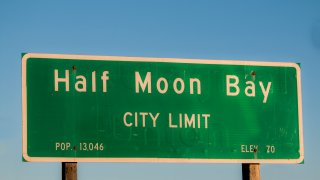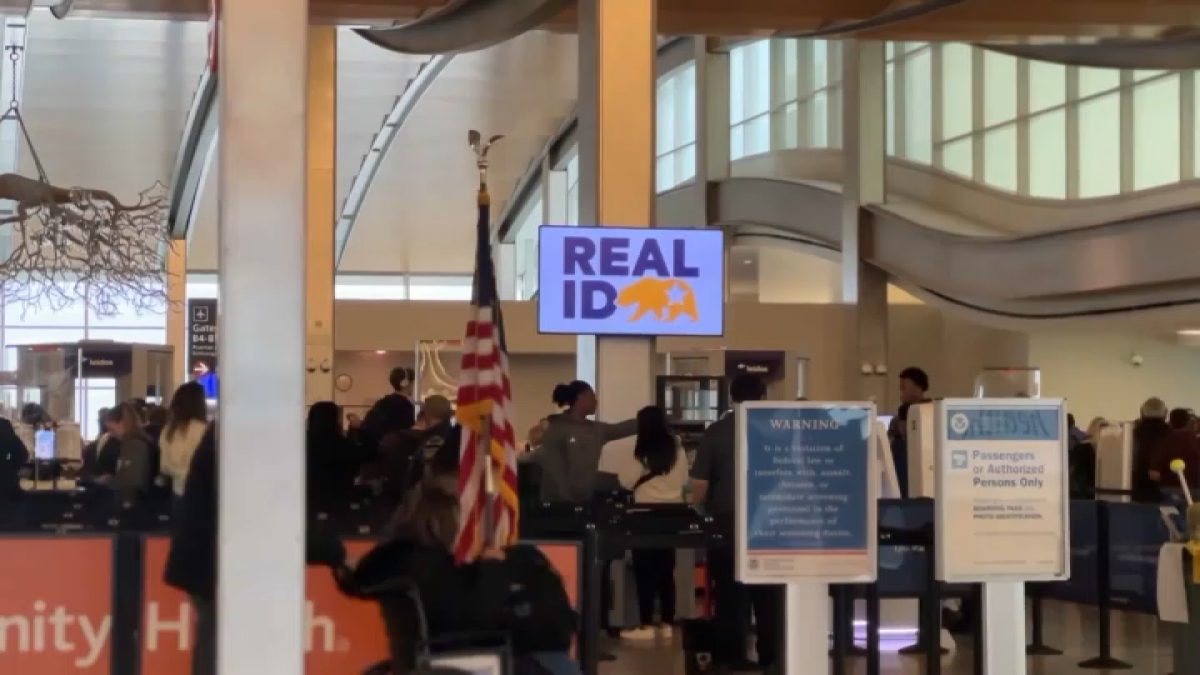
City limits sign for Half Moon Bay California. Standard green sign on wood posts against a blue background.
When Sarah Carlson was diagnosed with a malignant brain tumor at 9 years old, it changed her life forever.
Now at 25, the side effects of the chemotherapy and radiation treatment she received as a child have left her with processing difficulties, her mom Jeanne Carlson said.
"She remains an intelligent young lady but she has a hard time accessing that intelligence because of the Swiss cheese holes that the radiation punched in her brain," Carlson said.
Sarah is panhypopituitary, meaning she lacks pituitary hormones that control metabolism and growth. "What makes it scary for her to be out in the world is that she looks like a young lady, but emotionally reacts like a 9-year-old," Carlson said. Sarah needs constant direction from her parents, who take care of her every day. She loves Disney - along with puzzles, crafts and quilting - but might struggle to tell you her favorite show, because decision-making exhausts her.
Being disabled can be isolating, Carlson said, and even more so because they live up at King's Mountain, overlooking Half Moon Bay. Amenities are limited.
Like many parents of adults with special needs, Carlson wonders where Sarah will go when her parents can no longer take care of her.
Carlson found a community for Sarah through the Big Wave Project, a nonprofit and cooperative for adults with special needs and their parents. It's existed since 2000 and offered activities like sports and a community farm. Pre-pandemic, Sarah played basketball, tennis and swam with her teammates.
Local
After raising $25 million in private funding, Big Wave this year began construction on phase one of its housing project in Half Moon Bay, where adults with developmental disabilities will be able to live and work in an independent community. The two-story building will house residents, a community center and businesses that will provide employment.
It's a huge relief for parents like Jeanne Carlson.
"If you ask (Sarah), she'd want to stay at home with mommy forever, but Bill and I aren't going to live forever," Carlson said. "We want her to be settled and secure in a place where she can thrive well before there's any issue with our health."
The Big Wave project - which will accommodate up to 57 residents when complete - fills the gap when it comes to housing and employment in the special needs community. San Mateo County's Department of Housing says online that there isn't enough housing for adults with disabilities in the county and waiting lists can be one to five years long.
Residents will also be able to volunteer on the Big Wave farm and take part in outings. The first phase of the project is scheduled to open in the fall of 2021.
"We're blessed in that we are a community looking for a building, which we're finally going to build, and not a building that's looking for a community," Jeff Peck, co-founder and CEO of Big Wave, said.
But it has not been an easy journey. Coastside development can be contentious, and Big Wave spent millions and fought for two decades to get the right approvals.
"It's very hard to build on the coast," Peck said. "It's been war, it's been a battle. It's been some good things and bad things, but everybody came together and kept fighting for this regardless of the time it took."
Big Wave is more than a project for Peck - it's personal. His daughter Elizabeth, 32, has intellectual disabilities. He and his wife dedicated themselves to making Elizabeth's life and future better.
Elizabeth will be one of the residents on site, and Peck thinks she will love living away from them, but admits it will be hard to let go.
"My daughter has never lived anywhere else," he said.
Peck said Big Wave is a community that can sustain itself for years, because of its unique, three-part business model.
First, the nonprofit provides affordable housing. With special needs adults earning less than $800 a month in federal supplemental security income, affordability is key. Peck said rent will be around $700 a month, a fraction of the thousands of dollars a month that he says similar facilities might charge.
Second, the businesses on site will form the for-profit part of the project as commercial tenants will help subsidize the residents' rents. But businesses will be carefully selected, Peck said, as they need to be willing to work with special needs adults.
Third, Big Wave's longstanding community of families provides the support and decision-making that form the backbone of the entire project. It was the parents who drove the fundraising that make the project possible.
Some of the local businesses that have already committed to the project are flower shop Bubbles and Blooms, Sammy's Cafe - an offshoot of popular coastside dining spot Sam's Chowder House - and One Step Beyond, an organization that will run a day program and culinary academy.
Julie Shenkman, co-owner of Sam's Chowder House with her husband Paul, said that deciding to participate in the Big Wave Project was a "complete no-brainer."
"It was a natural fit for us," Shenkman said. "But really it's all driven from our son. He's our total heart and whatever we can do to help make his future better is something that we want."
The Shenkman's son, Sam, is a 19-year-old with developmental delays who will be one of Big Wave's residents.
Sam - who's very social - loves helping out at the chowder house by greeting customers. Shenkman is excited that Sam will be able to hang out with his friends at Big Wave, which she describes as a "critical project."
"Here on the coast we have built low-income housing, and we have built senior housing and we've built a community library but we've just not built this solution for the special needs community," Shenkman said.
Big Wave brings relief to many parents or family members of adults with special needs, such as Sountru, a San Francisco resident whose niece Elizabeth, 30, was diagnosed with autism at age 3.
When Elizabeth's mother Barbara died 10 years ago, Sountru was already 60 years old. He wondered who would take care of her after he died.
He's excited for Elizabeth to transition to Big Wave. She doesn't speak, and might not initiate activities, but by Sountru's prompting, she'll do puzzles or crafts for a time. Sountru thinks living at Big Wave will give Elizabeth a wealth of activities to enjoy with likeminded people.
She will be protected from the world and surrounded by people who accept her, instead of judging her.
"People think that (people with autism) are stupid or they think they're crazy," Sountru said. "That's just not true. Elizabeth may not be able to speak but she has a very active inner mind that's amazing."
"Elizabeth does not stress or worry about things that you and I worry about every day," he continued. "She's going to live to be 150 years old, I swear it."
Throughout those years, Big Wave will be there.
The first phase of the Big Wave Project will house the first 37 of the intended 57 residents. They'll need more funding to start the second phase. For more information on Big Wave, visit https://www.bigwaveproject.org/home/.



